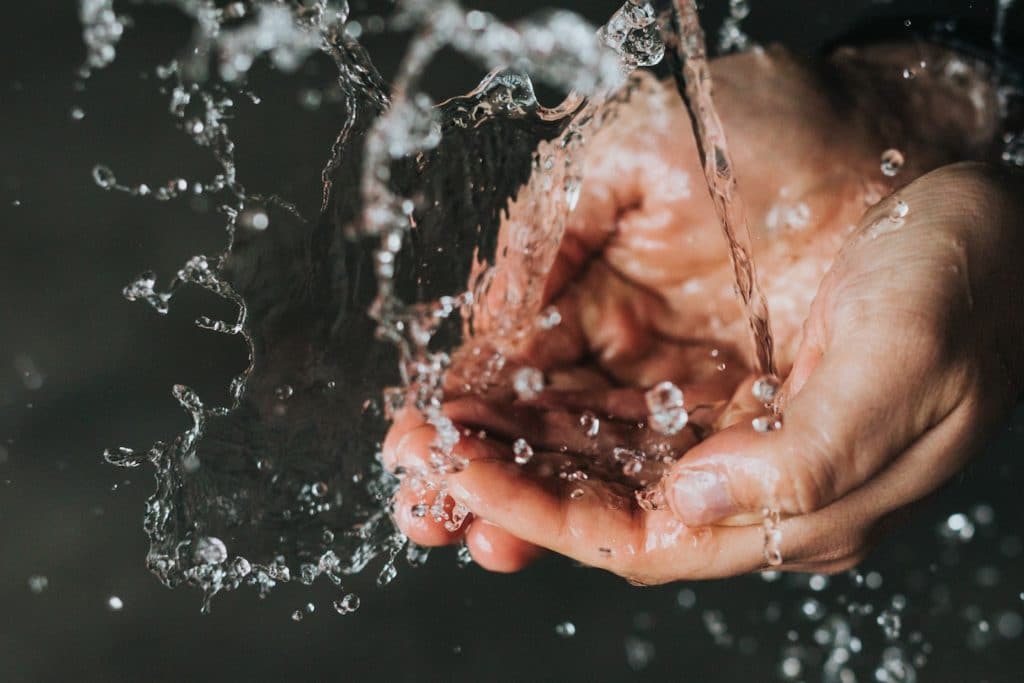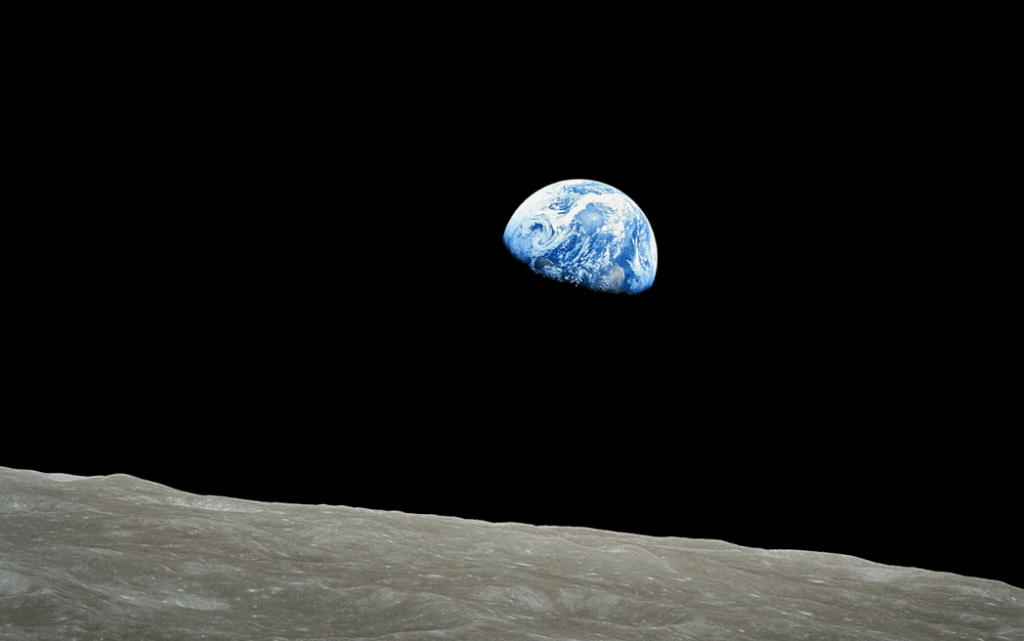
This post is not another list of precautions about the coronavirus. You doubtless have them already.
I won’t deny the enormous cost of the outbreak, including the tragedy of lives lost, businesses grounded, families disrupted, events canceled, teaching curtailed, and more. The list of consequences, known and not yet anticipated, will keep growing. The scale is boggling.
But when we extend our sight beyond the catastrophe, the virus may have something to teach us.
Is it time to see the world as one planet?

The astronauts of the Apollo 8 mission took the famous picture, Earthrise, that changed the world. People around the globe had the opportunity to see the earth as a planet, with continents, clouds, seas, viewed without the colored-in country lines we were used to seeing on maps and globes. That global perspective inspired the first Earth Day in April 1970 as well as the creation of the Environmental Protection Agency (EPA) in the United States later that year.
Sadly, in the intervening years, nationalism, war, closed borders, walls, and the rejection of refugees has tarnished this global perspective. (Add to that the taking apart of the mission of the EPA.)
Now we have a second chance. A coronavirus, COVID-19, is reminding us that we are together on one planet.
COVID-19 has spread across the globe, scoffing at national boundaries, distinctions between rich and poor, and ethnic divides. Scientists collaborate across borders, as we turn to science and medicine for real facts.
That’s not all bad.
However, fear strikes fast
Panic travels faster than COVID-19.
I’m not above it. I have a husband in the prime risk category: older with heart and lung problems. On top of that, he had a heart procedure last week and visited his doctor in a hospital where twelve victims of COVID-19 recently died. So when he called me in the middle of the night, three days after his surgery, panicked, and sounding ghastly, I listened. Unfortunately, I was 90 miles and two ferries away from home at a writing retreat. In a shaky, slightly delirious voice, he told me that he had a fever and couldn’t stop shaking. He felt weak, dizzy, and needed to vomit.
I knew what we both feared: Was this the dread coronavirus?
I called 911, and three emergency medical technicians (EMTs) sped to the house, wearing masks, visors, and comforting smiles. These men, not at all upset at being called out after midnight, began taking his vitals while asking a battery of questions. Within ten minutes, they had their verdict: he did NOT have COVID-19—most likely food poisoning. A good vomit later and he started to come back to life.
I realized how easy it is to panic.
When we panic, we see the worst and ignore other ways to look at the disease. We follow immediate precautions but fail to think about building the longer-term wellness of our communities.
As the virus runs its course, and we may be required to stay away from work, schools, or gatherings, why not consider what else there is to do?
What we can do
Connect with community. We’re in this together, globally, as well as locally. A safety net of community surrounded my husband when the EMTs raced to his side. Let’s build more durable safety nets for each other. Maybe we can check on a friend who can’t go out or notice who on the block might need extra help. We can lend support to the people, organizations, and businesses that are seeing their incomes evaporate. For example, our local movie theater, which offers great entertainment and events to our community, operates on a shoestring budget. We’ll need to make sure it survives.
Pay attention to the soil. Masks and hand sanitizers may help in the fight against the disease, but longer-term, our healthy habits, attitudes, and choices are what will sustain us. As a gardener, I’m not above reacting hysterically when an onslaught of pests or disease invades my garden. Before the buggers kill my kale, I want to DO something, hopefully organic, to fix the problem. But most of the time, the best defense I can offer the garden is to nourish the health of the soil. The planet needs such nourishment as well.
Respect science. People sometimes treat science the way a teenager treats her parents, disrespecting and doubting them at times, but running home for help in a crisis. Let’s give science a boost and refortify the decimated budget for the Center for Disease Control.
Understand that we’ll always live with uncertainty. It may be a bummer, but we can’t control the world. I don’t like hearing surprises such as a friend’s cancer diagnosis, but they come with being human. Just because we can be technologically fancy doesn’t protect us from the volatility, unpredictability, and uncontrollability that’s part of life.
Last weekend, I read “Wash Your Hands” a poem by Dori Midnight, who has pulled beauty out of the viral chaos. It’s worth reading the entire brilliant piece.
 From Dori Midnight “Wash Your Hands”
From Dori Midnight “Wash Your Hands”
“…Wash your hands
like you are washing the only teacup left that your great grandmother carried across the ocean, like you are washing the hair of a beloved who is dying, like you are washing the feet of Grace Lee Boggs, Beyonce, Jesus, your auntie, Audre Lorde, Mary Oliver- you get the picture.
Like this water is poured from a jug your best friend just carried for three miles from the spring they had to climb a mountain to reach.
Like water is a precious resource
made from time and miracle…”
She inspired me to think about how I could use my moments of handwashing.
The gift of twenty seconds
Taking twenty seconds to wash one’s hands can seem like a long time, yet it’s just enough time to:
- Take two deep and renewing breaths.
- Enjoy the running of water and the sloshing of hands.
- Admire the buds on the Japanese maple outside the window.
- Send a blessing to first responders, doctors, and everyone working to address the crisis.
- Say a prayer for those harmed by the disease.
- Offer gratitude for something taken for granted, like clean water.
- Appreciate how the planet is interconnected.
Handwashing can be transformed into a moment of mindfulness.
In twenty seconds of washing, let’s start clearing away global toxicities like greed and separation, and rinse away the fear this virus is causing.
Then, let’s prepare to hold hands again, spanning across the globe.










11 Responses
Absolutely beautiful post, Sally! Thank you!
Thank you Wendy!
Thank you for the gifts like this you give us Sally. It’s a crazy time we’re in right now. Your message is a light that shines hope into a somewhat scary and uncertain darkness many of us are trying to see our way through right now. ❤️
Thank you Nancy!
Love this! There is so much opportunity in this situation.
Thank you Donna.
Sally,
I do not write comments. In fact, this is my very first EVER!!!
As a MD I have discussed Covid-19 with so many people. I have discussed it clinically with data and science. Your article brought me to tears. Such warmth and insight and just what everyone needs to hear. I personally am having difficulty not connecting with people through touch, I will now recite your line..”let’s prepare to hold hands again, spanning across the globe”.
Thank you Mary, and thank you for the enormous contribution you have made and are continuing to make to the health of our community. Thank you, too, for the note.
Thank you Sally for sharing.
I’m doing well and being more mindful about washing my hands.
I feel badly for the folks who are scared and sick.
I’m enjoying less humans on the highways, at my athletic club and in the stores.
I’m grateful for my zoom classes and meetings.
I’m praying for the virus to run it’self dry and we’re all reconnected again in person.
I’d like to remind others that stress caused by fear compromises our immune systems.
Please love yourselves.
Thank you Sally! This is just what we all need to hear as we hunker down and try to stay informed (but try not to freak out). I love that you used hand washing as an opportunity to pause and reflect, taking time to breathe and extend thoughts of gratitude while we wash with gusto. I think humans are currently in need of a serious wake up call to remind us of just how interconnected we all are. Perhaps this will be our silver lining in these strange times.
Thank you, Sally, for re-engaging us with your presence. I have been experiencing heightened anxiety (as I’m sure we all have) and have been looking for solace and … hmmm… intelligent coping mechanisms. Your blog is one of those. I am saddest (if that’s a word) about having to close our church. We are doing videos and may be live-streaming this coming Sunday and this week we are making the list to assign people to parishioners so everyone is covered and regularly called. I’m sad because this is the time people most need to be hugged and loved and held and to find solace in the sacraments of their worship spaces (regardless of religion) and we are only able to offer to comfort through our voices on a phone line. Nevertheless, gratitude persists. To your friend Mary, above: deepest gratitude for all that you are doing – I/we are sending many good thoughts and prayers and “holy energy” to all of you in the medical community who are giving so selflessly of yourselves. Thank you for sharing your thoughts and thank you again, Sally, for sharing yours and Dori Midnight’s beautiful poem. Gratefully…